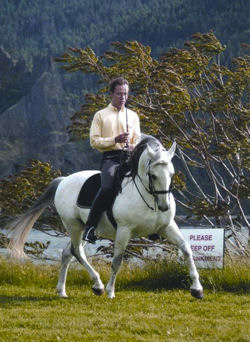Feeding the Performance Horse

The horse is a natural athlete. He is strong, agile and swift. His strength is so superior to that of man that we describe the thrust of our high powered engines in terms of horse power. Yet, the grace and beauty of the horse surpasses that of a ballet dancer. As caregivers, it is up to us to keep our equine partners healthy by providing them with the vital nutrients needed to perform in a human world that differs so dramatically from their own.
Most horse owners have a basic understanding of how to feed a horse. We know that dietary consistency is essential, since the slightest change in feed or feeding routine can often upset the equine digestive system. We know that any variance in the feeding protocol should be limited and introduced slowly to minimize the negative effects of frequent, rapidly applied change. When change is necessary, we rely on information from trusted sources and past experience for guidance. We are careful to make the most appropriate choices from the abundance of available dietary additives. We are aware that any change in feeding protocol will have a profound impact on the performance of our horses. Most experts agree that a diet of hay, grain, water and salt will provide the basic nutritional needs of most horses. We will now consider each of these individually.
 First and foremost is hay, also referred to as forage. Since the horse is a grazing animal by nature, forage should be the main component of the diet. It is, therefore, important to buy the best possible hay available within your budget. A good grass or grass/legume mix, fed at 1.5% body weight (approximately 15 lbs hay/1000 lbs) per day is usually the best choice for horses. This may vary depending upon the overall health of the horse, how well the horse maintains its weight, the activity level of the horse, and current weather conditions. For example, horses that suffer from ulcers may respond better to a grass/alfalfa mix because of the calming effect of this mix on the stomach. In some areas, a selenium supplement may be added to the diet due to a lack of this mineral in the hay source.
First and foremost is hay, also referred to as forage. Since the horse is a grazing animal by nature, forage should be the main component of the diet. It is, therefore, important to buy the best possible hay available within your budget. A good grass or grass/legume mix, fed at 1.5% body weight (approximately 15 lbs hay/1000 lbs) per day is usually the best choice for horses. This may vary depending upon the overall health of the horse, how well the horse maintains its weight, the activity level of the horse, and current weather conditions. For example, horses that suffer from ulcers may respond better to a grass/alfalfa mix because of the calming effect of this mix on the stomach. In some areas, a selenium supplement may be added to the diet due to a lack of this mineral in the hay source.
 Grain plays an important, yet complex, role in the equine feeding protocol. Oats were historically the favored grain for horses. Now, however, horse owners rely heavily on grain combinations, often referred to as sweet feed. These usually consist of oats, corn, vitamins and minerals bound together with molasses for palatability. It is vitally important to understand that excess protein in the diet increases heat production. Since this excess heat can notably impede performance horses, care must be taken when determining the appropriate amount of daily grain. Adding carbohydrates and fats to the daily diet is the best way to counteract a lack of energy due to nutritional deficits. Of these, the preferred choice should be fats. Fats produce 2.5 times more energy per pound than carbohydrates, while decreasing heat load. Research shows that horses fed 10% added fat will reduce their daily heat load by 5%.(1) Fats can be increased by adding oils to the horse’s grain. A good choice is corn oil, since horses generally like the taste and there is the added benefit of improved skin and coat.
Grain plays an important, yet complex, role in the equine feeding protocol. Oats were historically the favored grain for horses. Now, however, horse owners rely heavily on grain combinations, often referred to as sweet feed. These usually consist of oats, corn, vitamins and minerals bound together with molasses for palatability. It is vitally important to understand that excess protein in the diet increases heat production. Since this excess heat can notably impede performance horses, care must be taken when determining the appropriate amount of daily grain. Adding carbohydrates and fats to the daily diet is the best way to counteract a lack of energy due to nutritional deficits. Of these, the preferred choice should be fats. Fats produce 2.5 times more energy per pound than carbohydrates, while decreasing heat load. Research shows that horses fed 10% added fat will reduce their daily heat load by 5%.(1) Fats can be increased by adding oils to the horse’s grain. A good choice is corn oil, since horses generally like the taste and there is the added benefit of improved skin and coat.

Water and salt are both vital elements of the performance horse diet. It is imperative that all horses, and especially performance horses, have unlimited access to fresh water. Fresh water keeps the horse hydrated, aids in digestion, and helps to prevent colic. Salt helps to balance the system by slowing dehydration caused by sweating. A simple salt block is the easiest way to replenish salt lost during exercise. A more complete choice is a mineral block. These not only replace salt, but other vitamins and minerals as well, eliminating the need to add supplements that may affect palatability to the grain. Mineral blocks are also a good source of selenium for those localities lacking this mineral in the hay source.
 While many factors may necessitate a change in the performance horse diet, the most common reasons for modification are environmental conditions, health related issues and training schedules. Exposure to excessively warm temperatures may require a decrease in the heat load of the horse, as discussed above. Colder weather may require an increase in the heat load, which can be achieved by an increase in carbohydrates. Feed modification may also be necessary due to certain health issues, like pregnancy or aging. Any changes in feeding or care due to health issues should be discussed with your veterinarian to determine the best course of action. The timing of feedings can also affect performance and should be determined by how hard the horse will be working. For example, withholding grain up to 4 hours prior to exercise can help facilitate blood flow to muscles rather than the digestive system.
While many factors may necessitate a change in the performance horse diet, the most common reasons for modification are environmental conditions, health related issues and training schedules. Exposure to excessively warm temperatures may require a decrease in the heat load of the horse, as discussed above. Colder weather may require an increase in the heat load, which can be achieved by an increase in carbohydrates. Feed modification may also be necessary due to certain health issues, like pregnancy or aging. Any changes in feeding or care due to health issues should be discussed with your veterinarian to determine the best course of action. The timing of feedings can also affect performance and should be determined by how hard the horse will be working. For example, withholding grain up to 4 hours prior to exercise can help facilitate blood flow to muscles rather than the digestive system.
 In conclusion, the feeding protocol for the performance horse profoundly impacts its ability to perform. While we, as horse owners, have a basic understanding of the overall nutritional needs of our horses, diligence is required to ensure that an appropriate feeding regimen is maintained. Hay/forage and water are primary essentials. The preferred hay for horses is a grass or grass/legume mixture, although other combinations, like a grass/alfalfa mix, can be beneficial in special situations. Daily fresh water, which aids in digestion and helps prevent dehydration and colic, must be readily accessible. Along with forage and water, most equine diets now include a combination of grains and supplements. A sweet feed of oats, corn, vitamins and minerals combined with molasses is the most common. Occasionally, it may be necessary to supplement normal feedings with additional minerals, like selenium, that may be lacking naturally in the home environment of the horse. This can be accomplished by providing a simple mineral block which contains salt and essential minerals. In addition to what we feed, when we feed is equally important. The timing of feedings, especially prior to exercise, helps ensure that blood flow is directed to the muscles rather than the digestive system. This article is intended to provide general information on the creation of an appropriate dietary protocol for the performance horse. Your veterinarian is the best source of guidance when determining the specific dietary needs of your horse, as he/she is familiar with both your horse and the environmental factors of your area that may impact your horse’s performance.
In conclusion, the feeding protocol for the performance horse profoundly impacts its ability to perform. While we, as horse owners, have a basic understanding of the overall nutritional needs of our horses, diligence is required to ensure that an appropriate feeding regimen is maintained. Hay/forage and water are primary essentials. The preferred hay for horses is a grass or grass/legume mixture, although other combinations, like a grass/alfalfa mix, can be beneficial in special situations. Daily fresh water, which aids in digestion and helps prevent dehydration and colic, must be readily accessible. Along with forage and water, most equine diets now include a combination of grains and supplements. A sweet feed of oats, corn, vitamins and minerals combined with molasses is the most common. Occasionally, it may be necessary to supplement normal feedings with additional minerals, like selenium, that may be lacking naturally in the home environment of the horse. This can be accomplished by providing a simple mineral block which contains salt and essential minerals. In addition to what we feed, when we feed is equally important. The timing of feedings, especially prior to exercise, helps ensure that blood flow is directed to the muscles rather than the digestive system. This article is intended to provide general information on the creation of an appropriate dietary protocol for the performance horse. Your veterinarian is the best source of guidance when determining the specific dietary needs of your horse, as he/she is familiar with both your horse and the environmental factors of your area that may impact your horse’s performance.
Author: Dressage Academy
You May Also Like

Rhythm – Let’s Get into the Groove Newsletter
March 28, 2018
Rejuvenate Your Dressage Horse
July 6, 2017